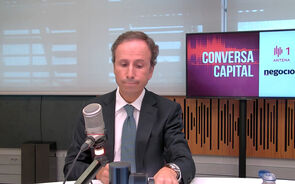Boas notícias
13 mensagens
|Página 1 de 1
tugatuga11 Escreveu:Elias, "forte alta" é mesmo uma força de expressão.

"Alta" talvez fosse o mais correcto. Concordas?
Abraço.
Nem por isso. Seria alta se fossem os índices, mas para mim futuros a subirem 1% é sempre forte alta (e isto porque a Europa costuma amplificar os movimentos dos futuros, sejam eles para cima ou para baixo). Vamos ver o que acontece...
- Mensagens: 35428
- Registado: 5/11/2002 12:21
- Localização: Barlavento
Já li algumas notícias a darem conta de que o processo de flexibilização do Yuan irá começar em breve, mas ao mesmo tempo encontrei outras notícias a desmentirem as primeiras. 
Afinal, onde ficamos?
Afinal, onde ficamos?
"Es gibt keine verzweifelten Lagen, es gibt nur verzweifelte Menschen" - Heinz Guderian
Trad. "Não existem situações desesperadas, apenas pessoas desesperadas"
Cartago Technical Analysis - Blog
Trad. "Não existem situações desesperadas, apenas pessoas desesperadas"
Cartago Technical Analysis - Blog
- Mensagens: 3056
- Registado: 20/1/2008 20:32
- Localização: Lisboa
arnie Escreveu:é impressão minha ou as traduções do google estão cada vez melhor?
Estão mesmo melhores a cada dia que passa. Os tipos são geniais
Remember the Golden Rule: Those who have the gold make the rules.
***
"A soberania e o respeito de Portugal impõem que neste lugar se erga um Forte, e isso é obra e serviço dos homens de El-Rei nosso senhor e, como tal, por mais duro, por mais difícil e por mais trabalhoso que isso dê, (...) é serviço de Portugal. E tem que se cumprir."
***
"A soberania e o respeito de Portugal impõem que neste lugar se erga um Forte, e isso é obra e serviço dos homens de El-Rei nosso senhor e, como tal, por mais duro, por mais difícil e por mais trabalhoso que isso dê, (...) é serviço de Portugal. E tem que se cumprir."
Elias Escreveu:Com ou sem recuo, os futuros dos EUA abriram em forte alta (mais de 1% no DOW, no SPX e no NDX.
Elias, "forte alta" é mesmo uma força de expressão.
"Alta" talvez fosse o mais correcto. Concordas?
Abraço.
Editado pela última vez por tugatuga11 em 20/6/2010 23:41, num total de 1 vez.
Pois, disseram isso ontem (sábado) mas hoje (domingo(recuaram)
BEIJING (AP) -- China's central bank said Sunday it would maintain a stable exchange rate and didn't anticipate major changes in the value of the yuan, a day after saying it would manage the currency more flexibly.
In a commentary on Saturday's announcement, the People's Bank of China attempted to assuage fears of a major strengthening of the yuan, also known as the renminbi, or "people's money."
"There is at present no basis for major flucuation or change in the renminbi exchange rate," the bank said on its website.
Keeping the rate at a "reasonable, balanced level" would contribute to economic stability and help restructure the Chinese economy with greater emphasis on services and consumption, the statement said.
The yuan's value has been pegged to the U.S. dollar for two years, a major source of friction with countries who say the yuan is undervalued to China's own benefit. The bank's statement said it would rely more on a basket of currencies that includes the U.S. dollar to determine the exchange rate.
Chinese officials have long said reforms to the currency would be gradual. While no specific policy changes were mentioned, financial markets will be watched closely Monday for any effects.
President Barack Obama said China's move would help protect the economic recovery, while the European Commission said it would benefit "both the Chinese economy and the global economy."
The announcement, timed just before President Hu Jintao's trip to the G-20 summit in Toronto, Canada, follows warnings from Beijing last week against making its currency policies a main focus of the meeting. China has come under heavy pressure to reform from G-20 member countries, including South Africa and Brazil as well as the United States and those in Europe, who argue that the yuan is deliberately undervalued to keep Chinese exports unfairly cheap.
Industrial Bank economist Jiang Shu said the timing of the announcement marked an attempt to divert criticism of China at the meeting.
"It's a way of throwing out the carpet for the G-20, displaying again to international society the Chinese government's determination on the exchange rate issue," Jiang was quoted as saying on the website of the National Business Daily, a leading financial newspaper.
However, some Chinese experts and commenters on Internet message boards criticized the announcement as a cave-in to foreign pressure that would ultimately damage China's crucial export sector.
"From an economic angle, the appreciation of the renminbi will have a definite effect on exports, but in terms of politics and macroeconomic policy, it can be seen as a result of the need for balance," said Zhao Xijun, deputy dean of the School of Finance of Renmin University.
Also writing on the National Business Daily website, economist Ye Tan said the move would pile pressure on exporters already contending with a roughly 15 percent appreciation of the renminbi against the euro, as well as rising labor costs.
"China's exports are unstable and this is having a major impact on the actual economy," Ye wrote. "Appreciation of the renminbi needs to wait until economic readjustment is certain and China's domestic demand has truly expanded," Ye said.
On the message boards at the popular Sohu.com portal, commentators vilified the move as a sellout that betrayed long-standing government claims that the exchange rate was not a problem. Some commentaries on there and other forums were quickly removed by censors drilled to stymie criticism of the government or discussion of sensitive topics.
Beijing has kept the yuan frozen against the dollar to help Chinese manufacturers compete amid weak global demand. Under pressure from its trading partners, China began letting the yuan appreciate gradually against the U.S. dollar in 2005, but halted that abruptly in 2008 as the global financial crisis took effect.
Since then, the yuan's value has remained at roughly 6.83 to $1.
BEIJING (AP) -- China's central bank said Sunday it would maintain a stable exchange rate and didn't anticipate major changes in the value of the yuan, a day after saying it would manage the currency more flexibly.
In a commentary on Saturday's announcement, the People's Bank of China attempted to assuage fears of a major strengthening of the yuan, also known as the renminbi, or "people's money."
"There is at present no basis for major flucuation or change in the renminbi exchange rate," the bank said on its website.
Keeping the rate at a "reasonable, balanced level" would contribute to economic stability and help restructure the Chinese economy with greater emphasis on services and consumption, the statement said.
The yuan's value has been pegged to the U.S. dollar for two years, a major source of friction with countries who say the yuan is undervalued to China's own benefit. The bank's statement said it would rely more on a basket of currencies that includes the U.S. dollar to determine the exchange rate.
Chinese officials have long said reforms to the currency would be gradual. While no specific policy changes were mentioned, financial markets will be watched closely Monday for any effects.
President Barack Obama said China's move would help protect the economic recovery, while the European Commission said it would benefit "both the Chinese economy and the global economy."
The announcement, timed just before President Hu Jintao's trip to the G-20 summit in Toronto, Canada, follows warnings from Beijing last week against making its currency policies a main focus of the meeting. China has come under heavy pressure to reform from G-20 member countries, including South Africa and Brazil as well as the United States and those in Europe, who argue that the yuan is deliberately undervalued to keep Chinese exports unfairly cheap.
Industrial Bank economist Jiang Shu said the timing of the announcement marked an attempt to divert criticism of China at the meeting.
"It's a way of throwing out the carpet for the G-20, displaying again to international society the Chinese government's determination on the exchange rate issue," Jiang was quoted as saying on the website of the National Business Daily, a leading financial newspaper.
However, some Chinese experts and commenters on Internet message boards criticized the announcement as a cave-in to foreign pressure that would ultimately damage China's crucial export sector.
"From an economic angle, the appreciation of the renminbi will have a definite effect on exports, but in terms of politics and macroeconomic policy, it can be seen as a result of the need for balance," said Zhao Xijun, deputy dean of the School of Finance of Renmin University.
Also writing on the National Business Daily website, economist Ye Tan said the move would pile pressure on exporters already contending with a roughly 15 percent appreciation of the renminbi against the euro, as well as rising labor costs.
"China's exports are unstable and this is having a major impact on the actual economy," Ye wrote. "Appreciation of the renminbi needs to wait until economic readjustment is certain and China's domestic demand has truly expanded," Ye said.
On the message boards at the popular Sohu.com portal, commentators vilified the move as a sellout that betrayed long-standing government claims that the exchange rate was not a problem. Some commentaries on there and other forums were quickly removed by censors drilled to stymie criticism of the government or discussion of sensitive topics.
Beijing has kept the yuan frozen against the dollar to help Chinese manufacturers compete amid weak global demand. Under pressure from its trading partners, China began letting the yuan appreciate gradually against the U.S. dollar in 2005, but halted that abruptly in 2008 as the global financial crisis took effect.
Since then, the yuan's value has remained at roughly 6.83 to $1.
- Mensagens: 611
- Registado: 3/4/2008 11:50
para aqueles que como eu são completamente iletrados na lingua francesa, fica a tradução do texto.
é impressão minha ou as traduções do google estão cada vez melhor?
é impressão minha ou as traduções do google estão cada vez melhor?
Sob a pressão intensa E.U., a China anunciou neste sábado sua decisão de promover uma maior flexibilidade na flutuação do yuan e prosseguir a reforma do mecanismo de taxas de câmbio de sua moeda, imediatamente saudou a iniciativa dos Estados Unidos e FMI.
"O banco central da China decidiu continuar a apoiar a reforma do mecanismo da taxa de câmbio de RMB (yuan) e aumentar a flexibilidade da RMB taxa de câmbio", disse o banco central da China em seu site.
O anúncio vem uma semana antes da abertura da cimeira do G20, em Toronto (Canadá) e sob intensa pressão, principalmente de Washington a Pequim para retomar a força de um sistema de taxa de câmbio mais flexíveis que permitem que o renminbi (moeda do povo , um outro nome para o yuan) para apreciar.
Os Estados Unidos esperam para ver o início de um reequilíbrio do comércio com a China, a quem acusam um enorme déficit comercial.
Presidente Barack Obama no sábado, saudou a decisão chinesa.
"A decisão da China de aumentar a flexibilidade de sua taxa de câmbio é um passo construtivo que pode ajudar a sustentar a recuperação e contribuir para uma economia mundial mais equilibrada", disse ele em um comunicado.
Seu secretário do Tesouro, Timothy Geithner também saudou o anúncio, ressaltando que "a implementação vigorosa (esta decisão) irá dar um contributo positivo para o crescimento global" forte e equilibrado.
O Diretor-Geral do Fundo Monetário Internacional (FMI), Dominique Strauss-Kahn, tem, entretanto, descreveu como "muito encorajador" o gesto de Pequim.
"A RMB forte é coerente com as conclusões do processo de avaliação mútua do G-20 a ser apresentado na próxima semana em Toronto e ajudar a aumentar o rendimento das famílias chinesas e criar incentivos ao investimento directo em relação às indústrias de servir Os consumidores chineses ", disse ele.
Para a Comissão Europeia, "A China vai enviar um sinal de confiança para a recuperação."
O banco central chinês tinha, no entanto, ressaltou que nada justifica "importantes mudanças ou alterações" na taxa de câmbio e reiterou que continuará a gerir a taxa de câmbio flutuar "dentro da banda (flutuação), já anunciado.
Os parceiros comerciais da China acredita que a desvalorização do yuan permite Pequim para exportar seus produtos a preços muito baixos.
China tem repetidamente rejeitou a pressão dos Estados Unidos, refere-se às suas próprias responsabilidades, sublinhando que a taxa de câmbio de sua moeda não é responsável pelos seus desequilíbrios estruturais.
Desde o Verão de 2008, o yuan flutuar dentro de uma faixa muito estreita de encontro ao dólar. Tem, por conseguinte uma apreciação face ao euro.
A moeda chinesa será discutido na cimeira do G20, em Toronto, apesar da oposição da China, afirmou sexta-feira que um alto funcionário canadense.
O assunto será discutido em um exercício de "avaliação mútua" para definir como o G20 pode contribuir para um crescimento forte e sustentável a nível mundial, afirmou o funcionário sob condição de anonimato.
Na sexta-feira, no entanto, a China tinha reiterado que a taxa de câmbio de sua moeda não está em causa e que não deve ser objecto de discussão em Toronto, que reunirá os principais países ricos e emergentes.
"Eu não acho que essa questão nunca foi no programa", disse Zhang Tao, um funcionário do banco central da China.
No final de maio, o presidente Hu Jintao, participará na Cimeira do G20, haviam discutido uma eventual aquisição da "reforma" gradual da taxa de câmbio, sem fixar um prazo.
Bons negocios,
arnie
arnie
- Mensagens: 3094
- Registado: 4/11/2002 23:09
- Localização: Viras à esq, segues em frente, viras à dir, segues em frente e viras novamente à dir. CHEGASTE
13 mensagens
|Página 1 de 1


